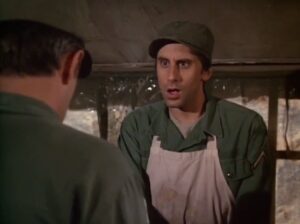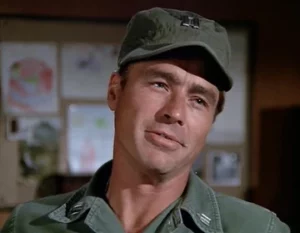MAS*H stands as one of television’s greatest achievements, not just for its groundbreaking blend of comedy and drama, but for its rich tapestry of unforgettable characters. While Hawkeye Pierce, B.J. Hunnicutt, and Margaret Houlihan often steal the spotlight, the show’s supporting cast created some of the most poignant and hilarious moments in television history. These seemingly minor characters brought depth, authenticity, and heart to the 4077th, transforming simple background roles into performances that resonated with millions of viewers.
Father Francis Mulcahy: The Moral Compass
Father Mulcahy, portrayed brilliantly by William Christopher, served as far more than the unit’s chaplain. He represented the conscience of the 4077th, a gentle soul navigating the moral complexities of war with unwavering faith and compassion. What made Mulcahy extraordinary was his quiet strength. Unlike characters who commanded attention through volume or bravado, Father Mulcahy’s power lay in his subtle presence and genuine concern for every person under his spiritual care.
Throughout the series, we witnessed Mulcahy’s internal struggles as he questioned whether his contributions mattered in a place where surgeons saved lives daily. His hearing loss in later seasons became a powerful metaphor for feeling overlooked and undervalued. Yet he never sought glory or recognition. Whether organizing charity events, comforting dying soldiers, or simply listening to someone’s troubles, Mulcahy embodied selfless service. The episode where he finally loses his temper and demands respect remains one of the series’ most cathartic moments, revealing the depth beneath his perpetually kind exterior.

Igor Straminsky: The Culinary Anti-Hero
Igor, played by Jeff Maxwell, became the butt of countless jokes about his terrible cooking, yet he evolved into one of MAS*H’s most endearing characters. His culinary disasters weren’t just running gags; they represented the absurdity of trying to maintain normalcy in abnormal circumstances. Igor knew his food was awful, but he showed up every day, serving mystery meat and unidentifiable stews with a mixture of pride and resignation that somehow made him heroic.
What audiences loved about Igor was his resilience and good nature despite constant ridicule. He never took offense when Hawkeye made jokes about his cooking potentially being used as a weapon. Instead, he developed a self-deprecating humor that made him part of the camp’s family. Igor represented every person doing an unglamorous job with dignity, reminding viewers that not all heroes perform surgery or lead troops.

Colonel Sam Flagg: The Paranoid Intelligence Officer
Edward Winter’s portrayal of the unhinged CIA agent Colonel Flagg injected a unique brand of chaos into MAS*H. Flagg wasn’t just paranoid; he was magnificently, outrageously paranoid, seeing communist conspiracies in everything from poker games to medical procedures. His sporadic appearances throughout the series provided some of the show’s most absurdist comedy, yet beneath the lunacy lay sharp social commentary about Cold War hysteria and government overreach.
Flagg’s character worked because he was simultaneously threatening and ridiculous. His willingness to sacrifice anyone for “national security” made him genuinely dangerous, yet his bumbling execution of schemes and tendency to literally throw himself through windows made him cartoonish. This duality created uncomfortable laughter, forcing viewers to confront the real-world implications of unchecked authority and fear-mongering.

Sergeant Zelmo Zale: The Everyman Soldier
Johnny Haymer’s portrayal of Sergeant Zale represented the average enlisted man, neither a hero nor a coward, just someone trying to survive and maybe make a little money on the side. Zale ran various schemes and black-market operations, embodying the entrepreneurial spirit that flourished in war’s chaos. He wasn’t malicious; he simply understood that in a place where tomorrow wasn’t guaranteed, you might as well make today more comfortable.
Zale’s importance lay in his ordinariness. While doctors performed miraculous surgeries and commanders made life-or-death decisions, Zale worried about getting decent coffee, finding entertainment, and turning a profit. This grounded perspective reminded audiences that war affects everyone differently, and survival takes many forms.
Nurse Kellye Yamato: Breaking Barriers with Grace
Kellye Nakahara’s portrayal of Nurse Kellye evolved from background presence to significant character, representing both Asian-American visibility and the often-overlooked contributions of nursing staff. Her journey culminated in the powerful episode “Hey, Look Me Over,” where she confronted Hawkeye about his tendency to overlook her while pursuing other nurses. This moment transcended typical sitcom fare, addressing real issues of representation and respect.
Kellye’s character demonstrated that supporting roles could carry substantial weight and meaning. She wasn’t defined by romantic subplots or comic relief; instead, she was a competent, intelligent professional who demanded to be seen as a complete person. Her presence challenged stereotypes and expanded MAS*H’s representation of the diverse people who served during the Korean War.
The Lasting Impact
These five supporting characters exemplify why MAS*H remains relevant decades after its finale. The show understood that every person has a story worth telling, that comedy and tragedy coexist in human experience, and that the “minor” characters often carry major significance. Their legacy reminds us that great television requires more than star power—it needs depth, authenticity, and the courage to let supporting characters shine.